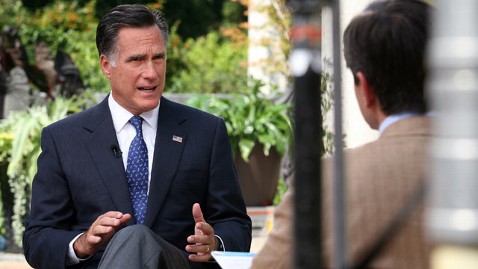Romney on Iran: Share Same 'Red Line' As Obama

Martin H. Simon/ABC
Mitt Romney has skewered President Obama's Iran policy. But in an exclusive interview, days after the Israeli Prime Minister criticized the U.S. for not putting "red lines before Iran," Romney told me he would draw the same line in the sand as Obama.
"My red line is Iran may not have a nuclear weapon. It is inappropriate for them to have the capacity to terrorize the world. Iran with a nuclear weapon or with fissile material that can be given to Hezbollah or Hamas or others has the potential of not just destabilizing the Middle East. But it could be brought here," Romney said.
"Look, Iran as a nuclear nation is unacceptable to the United States of America," he said.
I pointed out that President Obama also says it is unacceptable for Iran to have a nuclear weapon and asked Romney if he therefore has the same "red line" as Obama?
"Yes," Romney said.
The difference, Romney says, is what he would do to keep Iran from reaching the line.
Get more pure politics at ABCNews.com/Politics and a lighter take on the news at OTUSNews.com
"I spoke some years ago in Israel at the Herzliya Conference and laid out seven steps to keep Iran from becoming nuclear. They have not been taken, until one, more recently. I said that crippling sanctions needed to be put in place immediately."
Had those sanctions been implemented Iran's economy "would be on its knees at this point," Romney said.
"That combined with standing up with Iranian dissidents, the president was silent, when dissidents took to the streets in Tehran. I would have spoken out in favor of representative government and against the Ahmadinejad regime. The president was silent. In addition, I think Ahmadinejad should have been indicted under the genocide conviction," he said
Is Egypt an Ally?
When asked if Egypt is an ally - the same question Obama hesitated answering and later clarified - Romney was clear: yes.
"Well, right now, officially, Egypt is an ally of the United States, under the policy of the United States. The president's saying they are not may reflect the fact that there's been a change in government and a change in relationship as a result of that," he said.
"And what their status will be going forward in terms of the relationship with our nation is something which I'm sure will be developing over time," Romney told me.
As president Romney said he would bring Egypt closer, as long as they understand "that it's an advantage to have a close relationship with the United States, to be an ally of the United States."
"And for that to continue, Egypt must honor their agreement with Israel, for peace with Israel. Egypt must also respect the rights of minorities in their nation. And Egypt must also protect the lives and sovereignty of our embassy and of our installations in Egypt," he said.
The question over America's relationship with Egypt arose after violent protests erupted outside the U.S. Embassy in Cairo - sparked by the film "The Innocence of Muslims."
Romney said he has not seen the film and doesn't intend to, calling the situation "dispiriting."
"The idea of using something that some people consider sacred and then parading that out a negative way is simply inappropriate and wrong. And I wish people wouldn't do it," Romney told me. "Of course, we have a First Amendment. And under the First Amendment, people are allowed to do what they feel they want to do. They have the right to do that, but it's not right to do things that are of the nature of what was done by, apparently this film."